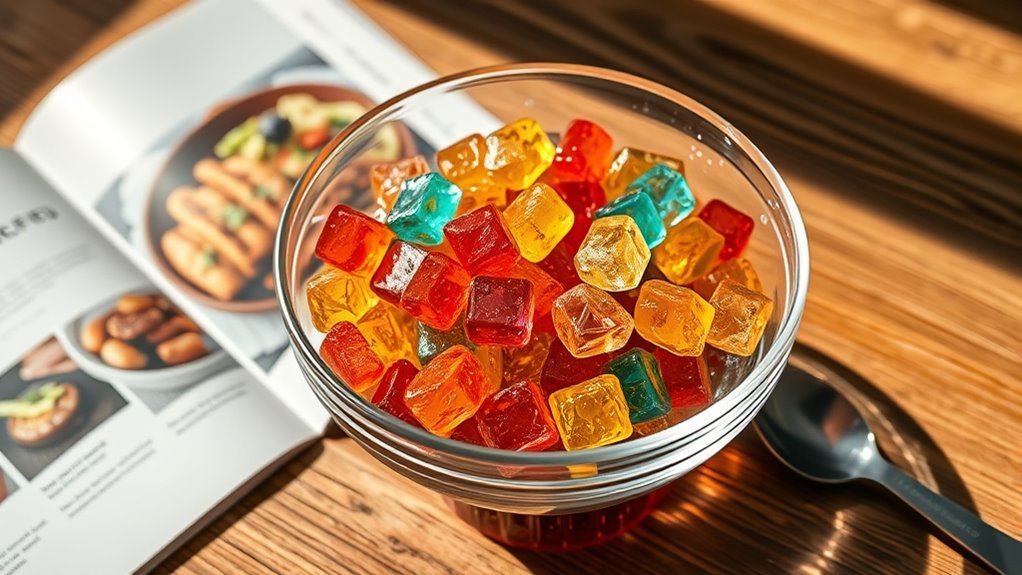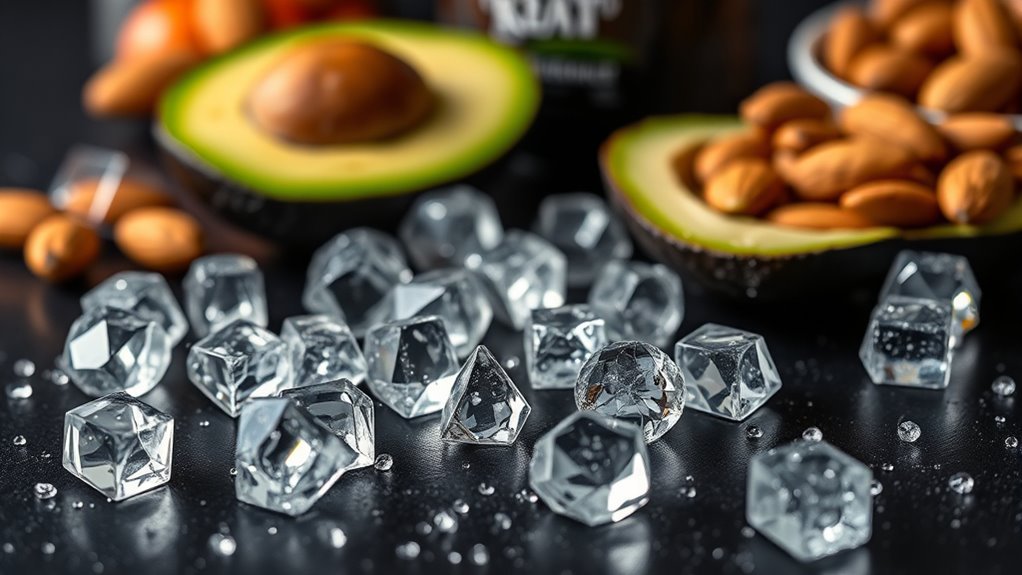Sugar alcohols do count as carbs on a keto diet, but they typically have fewer net carbs than regular sugars. Since sugar alcohols aren’t fully absorbed, they can result in lower caloric intake and a reduced impact on blood sugar levels. Common options like erythritol have 0.2 grams of net carbs per teaspoon, making them a better choice for low-carb diets. If you’re curious about how to incorporate them effectively, you’ll discover more insights.
Understanding Sugar Alcohols

While you might be familiar with traditional sugars, sugar alcohols are a different category of sweeteners that can often be found in low-carb and sugar-free products. These sweet alternatives, like erythritol and xylitol, offer a lower-calorie option for those watching their carbohydrate intake. However, it’s crucial to be aware of their digestive effects. Sugar alcohols can cause gastrointestinal discomfort in some individuals, leading to bloating or diarrhea, especially when consumed in large amounts. This variability means you should monitor how your body reacts to different sugar alcohols. By understanding these factors, you can make informed choices that align with your dietary goals and lifestyle, enjoying the freedom to indulge without compromising your health.
How Sugar Alcohols Are Processed in the Body

When you consume sugar alcohols, your body processes them differently than regular sugars. They undergo a unique metabolism that often results in a lower impact on blood sugar levels. Understanding this can help you make informed choices about their role in your diet.
Metabolism of Sugar Alcohols
As your body processes sugar alcohols, it’s important to understand how they differ from regular carbohydrates. Unlike standard sugars, sugar alcohols undergo a unique path in sugar metabolism. They’re not fully absorbed in the small intestine, leading to a lower caloric impact. This partial absorption means they contribute fewer net carbs to your diet, making them attractive for low-carb lifestyles.
When sugar alcohols are consumed, they can ferment in the gut, which may cause gas or bloating for some. However, their lower glycemic index means they don’t spike blood sugar levels as traditional sugars do. Understanding this can empower you to make informed choices, enjoying the benefits of sugar alcohols while maneuvering your dietary preferences.
Impact on Blood Sugar
Sugar alcohols have a unique impact on blood sugar levels, primarily due to their distinctive metabolic pathway. Unlike regular sugars, they’re only partially absorbed in your intestines, which means they have a minimal effect on blood sugar regulation. When you consume sugar alcohols, your body typically experiences a lower insulin response compared to traditional carbohydrates. This makes them a popular choice for those following a keto diet. However, individual responses can vary; some people might still experience fluctuations in blood sugar. It’s essential to monitor your own reactions to different types of sugar alcohols. Ultimately, understanding how they affect your body can empower you to make informed choices that align with your dietary goals. Additionally, checking nutrition labels for hidden sugars in products containing sugar alcohols is crucial to maintain ketosis.
Net Carbs vs. Total Carbs

While many people focus on the total carbohydrate count in their diets, understanding the distinction between net carbs and total carbs is essential, especially for those managing their carbohydrate intake. Total carbs include all carbohydrates in a food, while net carbs subtract fiber and certain sugar alcohols, which don’t greatly impact blood sugar levels. For keto enthusiasts, carb counting often revolves around net carbs to stay within keto guidelines. This approach allows for greater flexibility, enabling you to enjoy a variety of foods without exceeding your carb limit. By focusing on net carbs, you can maintain your energy levels and support your keto lifestyle while still indulging in some treats. Additionally, understanding hidden carbs helps ensure that your overall carb intake remains within the desired range for ketosis.
Common Sugar Alcohols and Their Carb Content
When it comes to sugar alcohols, understanding their carb content is essential for making informed dietary choices. Popular options like erythritol, xylitol, and sorbitol each have different impacts on your net carb intake. By breaking down their carb content, you can better navigate how they fit into your overall nutrition plan.
Popular Sugar Alcohols
Understanding the various types of sugar alcohols is essential for anyone monitoring their carbohydrate intake. While there are several options out there, here are three popular sugar alcohols you might encounter:
- Erythritol: Contains 0.2 grams of net carbs per teaspoon, making it a favorite among low-carb enthusiasts.
- Xylitol: Has about 2.4 grams of net carbs per teaspoon but can cause digestive issues for some.
- Mannitol: Offers around 2 grams of net carbs per teaspoon and is less commonly used.
It’s important to address common misconceptions: not all sugar alcohols affect blood sugar the same way. Knowing their carb content helps you make informed choices while enjoying low-carb foods and maintaining your desired freedom in your diet.
Net Carbs Explained
Knowing how net carbs are calculated is essential for anyone looking to manage their carbohydrate intake effectively. The net carb calculation involves subtracting fiber and certain sugar alcohols from total carbohydrates. Common sugar alcohols like erythritol and monk fruit sweetener contribute minimal net carbs because your body doesn’t fully digest them. For instance, erythritol has zero net carbs, while others like maltitol may have higher impacts. When you’re carb counting, it’s vital to read labels closely, as different sugar alcohols can affect your ketosis differently. Understanding these distinctions allows you to enjoy sweet flavors without compromising your low-carb goals, giving you the freedom to choose wisely while staying on track with your dietary preferences. Additionally, being aware of how sugar alcohols impact net carbs can help you make informed decisions about your keto-friendly choices.
Incorporating Sugar Alcohols Into a Keto Diet
As you explore ways to maintain a ketogenic diet, incorporating sugar alcohols can be a strategic choice that helps satisfy your sweet cravings without significantly impacting your net carb intake. Here are some sugar alcohols benefits you might enjoy:
- Reduced Calories: Sugar alcohols typically contain fewer calories than regular sugar, so they can help you stay within your daily limits.
- Blood Sugar Control: They have a lower glycemic index, making them a better option for maintaining stable blood sugar levels.
- Versatile Recipes: You can easily find sugar alcohols recipes that fit your keto lifestyle, from desserts to beverages. Additionally, it’s important to consider that maltitol’s glycemic index is higher than some other sugar alcohols, which can affect your carb intake.
Tips for Choosing Sugar Alcohols on Keto
When it comes to choosing sugar alcohols for your keto diet, being selective can make a significant difference in your overall experience. Start by reading labels carefully; not all sugar alcohols are created equal. Look for brands that use erythritol or monk fruit, as these have minimal impact on blood sugar levels. Be wary of products containing xylitol or maltitol, which can cause digestive issues and spike insulin. Additionally, consider the net carbs when evaluating your options. Choosing brands that clearly state their carb counts helps you stay on track. Finally, remember that moderation is key; too much of any sugar alcohol can lead to gastrointestinal discomfort. Enjoy the freedom of keto by making informed choices!
Frequently Asked Questions
Can Sugar Alcohols Cause Digestive Issues on a Keto Diet?
Yes, sugar alcohols can cause digestive discomfort for some people on a keto diet. Your individual tolerance plays a significant role in how they affect you. While they’re lower in calories and carbs, they can lead to bloating, gas, or diarrhea, especially in larger amounts. It’s essential to start with small quantities to see how your body reacts, allowing you to enjoy the benefits without the unwanted side effects.
Are Sugar Alcohols Safe for Diabetics?
Sugar alcohols can be a sweet lifeline for diabetics, offering a taste of freedom without the sugar spike. Regarding sugar alcohols safety, they generally have a minimal impact on blood glucose levels, making them suitable in moderation for diabetic nutrition. However, everyone’s body reacts differently, so it’s wise to monitor your blood sugar and consult a healthcare professional to find what works best for you. Enjoy the sweetness responsibly!
Do Sugar Alcohols Have an Effect on Weight Loss?
Sugar alcohols can impact weight loss, but it varies per person. They’re popular sugar alternatives because they’re lower in calories and have a lesser effect on blood sugar. However, consuming them in excess may lead to digestive issues, which could hinder your weight loss efforts. It’s important to balance them with whole foods and pay attention to how your body reacts. Moderation is key to achieving your weight loss goals effectively.
Can I Use Sugar Alcohols in Baking?
Absolutely, you can use sugar alcohols in baking! Think of it like trading in your trusty old car for a sleek, fuel-efficient model. Sugar alcohols are great sweetener alternatives that can help you enjoy treats without the carbs. When using them, consider these baking tips: they might not caramelize like sugar, so adjust your recipes accordingly. Experiment with the ratios to find the perfect balance, and enjoy your delicious creations guilt-free!
How Do Sugar Alcohols Compare to Regular Sugar in Taste?
Sugar alcohols often have a different taste compared to regular sugar. While many people find them to be less sweet, the sweetness level can vary by type—some can be nearly as sweet as sugar, like erythritol, while others, like maltitol, may not hit the mark. You might also notice a slight aftertaste with certain sugar alcohols, which can affect your overall flavor experience in baking or cooking.
References
- https://www.ncbi.nlm.nih.gov/pmc/articles/PMC5622787/
- https://www.healthline.com/nutrition/sugar-alcohols
- https://www.webmd.com/diet/what-are-sugar-alcohols
- https://www.diabetes.org/nutrition/understanding-food/food-labels/sugar-alcohols
- https://www.nutrition.org.uk/healthyliving/healthyeating/sugar-alcohols.html
- https://www.mayoclinic.org/healthy-lifestyle/nutrition-and-healthy-eating/expert-answers/sugar-alcohols/faq-20058091
- https://www.sciencedirect.com/science/article/pii/S2212267218300025


